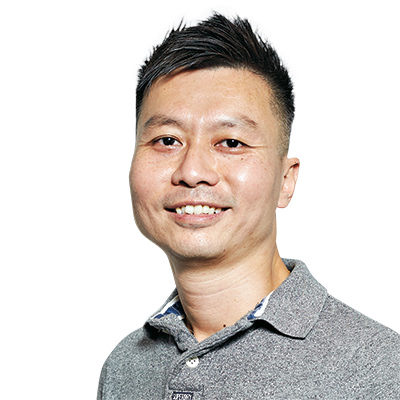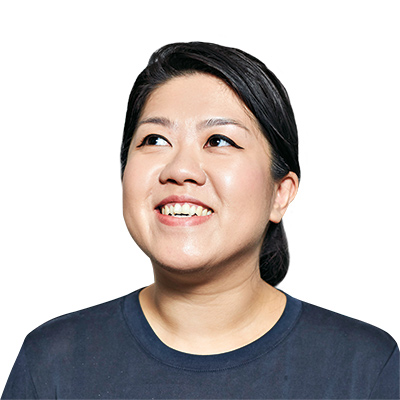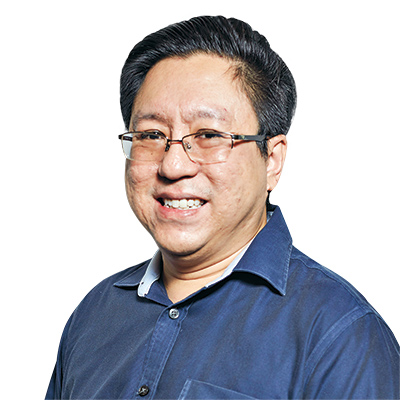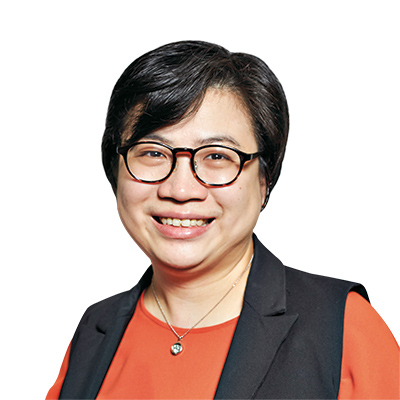Smart Nation: Too Clever for its Own Good?
NUS alumni debate on the advantages and pitfalls of the nation’s ongoing move towards hyper-connectivity and the adoption of next-gen technology in everyday life.
Tech it to the limit
Launched by Prime Minister Lee Hsien Loong in November 2014, Smart Nation is a Singapore Government-led initiative to harness infocomm technologies, networks and big data to develop people-centric solutions to address everyday challenges and increase efficiency.
OUR PANEL

Mr Sebastian Shen
(Design and Environment ’14)
39, Entrepreneur

Mr Alfred Goh
(Design and Environment ’99)
43, Business development for IT security company

Ms Li Sihui
(Arts and Social Sciences ’10)
32, Events and programme manager

Mr Laurence Putra Franslay
(Computing ’13)
29, Software engineer

Mr Ng Chee Chiu
(Computing ’04)
39, CEO, Websparks

Ms Tancy Tan
(Computing + USP ’03)
39, Digital transformation, J.P. Morgan
What is your personal understanding of the Smart Nation initiative?
Sebastian: It is an initiative that makes use of non-intrusive technology that one can opt-in to, in order to lubricate day-to-day activities and government decisions.
Alfred: It is the Internet of Things (IoT) on a national level. While there are clusters of activities — such as government agencies utilising big data analytics to solve traffic congestion problems — I don’t see a big concerted effort to bring it to the household level and move everybody in the same direction yet.
Tancy: It is about putting emerging technology into our everyday lives, such that it will help everyone — the government, companies and individuals — make wiser decisions. I do see a concerted effort to push this initiative to the lay person — the government disseminates a lot of information over the news channels. For example, the Sunday news on Channel 8 now has a segment on technology. The SkillsFuture app also has a lot of resources for everybody. There is a strong infrastructure and activity — our citizens just need to tap into it. Coming from the finance sector, I also see the government’s efforts in nurturing the ecosystem for fintech services — and there is a very active community here.
Chee Chiu: It is still in its early stages and the government is taking cautious steps before aggressively pushing out the whole chain of changes.
Laurence: While government agencies are taking small steps with initiatives like SingPass and the Parking.Sg app, you find that companies such as Singapore Power and Temasek Holdings are being progressive with their digitisation plans. I see this as an attempt to seed the initial momentum through government agencies and moving the bigger bets to the private sector.
Do you think the man on the street is aware of these developments, and embracing these new apps and technology?
I see Smart Nation as providing opportunities for communication between generations — such as when youngsters teach seniors how to use their phones or certain new technologies.
Mr Alfred Goh
Chee Chiu: For the people, the uptake is largely dependent on the usefulness of the app or technology. The Parking.Sg app is incredibly useful, and so many people use it. The ‘use case’ has to be sound before you even start talking about the technology.
Sihui: While some people might not be aware that certain things — such as the Moments of Life app for parents to register their child’s name online, or find a preschool near them — are part of the Smart Nation movement, these already impact them when they use the app. And the government has taken a lot of effort in marketing the technology and making people more comfortable with adopting it. However, I feel that there is an over-emphasis on the high technology — the “sexy stuff” — but not enough on the actual business applications.
Tancy: This is where the professionals have to come forward and lend their expertise. There is always a learning curve involved in the adoption of new technologies — and if there is support given at the initial phase, this would help individuals to master the features and get started on their self-learning journeys.
Laurence: This is also where the SkillsFuture push comes in: the government now wants to move towards having talent with cross-disciplinary experience, such as engineers with business operations know-how, and vice versa.

Given that different demographic groups have different levels of acceptance towards technology, do you think this will widen differences further?
Alfred: I actually see the move towards Smart Nation as an opportunity for communication between different generations — such as when youngsters teach seniors how to use their phones or certain new technologies.
Laurence: Just yesterday I had to teach my dad how to file taxes online!
Tancy: When we look at disparity, we look at benefits, and in a digital economy, the benefits to all are the same. To give an example, my aunt is ‘non-digital’, but she benefits just the same when I order groceries online for her. In that sense, it doesn’t widen differences.
Sihui: It will only widen differences when you live in an environment where you need technology in order to have certain access to things in life. And actually, I hear more stories about seniors adopting technology rather than not — be it in using WhatsApp to stay connected or using Netflix to watch Korean dramas.
WHAT’S APP-ENING
Some notable Smart Nation apps
 Beeline
Beeline
Beeline crowdsources requests and utilises anonymised public transport data to come up with new options for commuters.
 HealthHub
HealthHub
Access your family’s health records via this one-stop portal. It also offers health and wellness content, deals, rewards and e-services.
 Moments of Life (Families)
Moments of Life (Families)
Provides information needed by the parents and caregivers of young children.
 SgSecure
SgSecure
Use this app to report suspicious sightings, get alerts of emergencies and send information to the authorities should a major situation happen near you.
 OneHMap
OneHMap
An open geo-historical map platform that crowdsources photos to help trace the evolution of Singapore’s landscape.
Available on Google Play / App Store
What about the potential negative impacts this movement could have?
Better awareness will drive people and organisations alike to demand for better data security, and in turn drive developers and companies to take the issue more seriously.
Ms Tancy Tan
Laurence: My mother discovered YouTube and my data bills went through the roof! Jokes aside: Cleaners at foodcourts have told me off when I return used cutlery and bowls to the collection points — they feel that what I do will put them out of their jobs. Now, there are robots collecting plates.
Sebastian: There will be, and already are, many disruptions. SkillsFuture is one thing, but for the older folks — especially those who have been doing the same thing for the last 30 or 40 years — the idea that technology is taking the jobs away from them is very scary.
Alfred: Nobody is telling them that there are other ways of looking at this — that the machine is actually there to help them do their job better and faster.
Tancy: That is true. My job in the bank is to roll out robotics, so you can be sure that I am not the most popular person in the office! But really, the purpose of introducing robotics is not to take away jobs but to improve systems and processes. The real pitfall I see is information overload and the spreading of falsehoods. When the information flow is so fast, you don’t really have the capacity to decipher the truth. Also, while there is now all manner of information available out there, what is fed to us is already curated based on our consumption profile.
Laurence: This is especially so when you look at the political space, where those who support opposing groups interact only within their own community, thus mutually reinforcing their own beliefs and biases to the point where it cannot be broken down anymore. I also see another danger of a wired world: everything is hackable. This is why, as a software developer, I do not have any smart devices in my home.
Speaking of security, do you find that concerns about data protection can get in the way of people adopting ‘smart tech’?
Alfred: Security is often an afterthought and a lot of times, security measures are stop-gap at best. It is important to reference all your technology and have the security systems architected right from the start — unfortunately, that is rarely the case.
Sebastian: Also, a lot of white goods makers are not software companies — they don’t cover security loopholes. So, the general rule is: white goods + smart = don’t buy it!
Tancy: In a larger corporation, there are many stakeholders within the ecosystem that offer checks and balances. However, for a software engineer running his own start-up to think about this spectrum of topics would be impossible. This is where government and regulators come into place to impose standards on discipline, control and governance. Products should come with security labels that indicate the level of security they provide — just like foods with the “healthier choice” labels or appliances with the stickers that tell you about its energy efficiency.
Chee Chiu: However, technology advances at such a fast speed that any regulation would quickly become irrelevant. Education about security — and that it shouldn’t be an afterthought — is more critical.
Laurence: There needs to be education on the morality of what tech people do. Software engineers need to know that what they do has an impact on the lives of others.
Tancy: There is also effort from the government to educate the public — for example, Crimewatch often highlights cybersecurity cases these days. Greater awareness will drive people and organisations alike to demand for better data security, and in turn encourage developers and companies to take the issue more seriously.
All things considered, are you in favour of, or against, the Smart Nation transformation?
Sebastian: The technology space is one where Singapore can grow in international prominence way beyond the confines of its physical size. So, the Smart Nation agenda is something that I support.
Alfred: If it is ethically executed, then it can be good. But data collection in itself is a contentious topic.
Tancy: From the standpoint of a commoner, Smart Nation has helped a lot in terms of getting hold of your own information, and also in our day-to-day interaction with the government agencies. Considering the convenience it has provided, I would say that we should continue with this initiative.
Sihui: There will be a point where there isn’t an option for a country to be a “non-smart” nation, so basically we are just getting everybody up to speed — otherwise we will become the Luddites of a wired world. We just need to decide as a nation what it is that benefits everybody.
Chee Chiu: I think it is a beneficial thing as long as the people are in control of the information they share. It is about balancing between the convenience you want to enjoy and the risk you are willing to bear. As the country moves towards becoming a Smart Nation, we as individuals need to make smarter decisions for ourselves too.
If you’d like to join our Forum panel, do write to us at OARconnect@nus.edu.sg to express your interest and pick from our list of future discussion topics that you may want be part of.
Text By Koh Yuen Lin. Photos By Mark Lee.